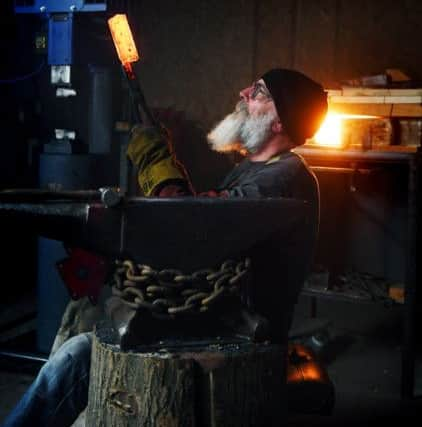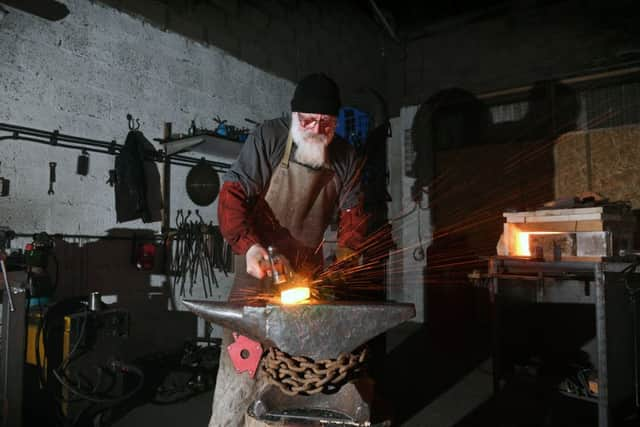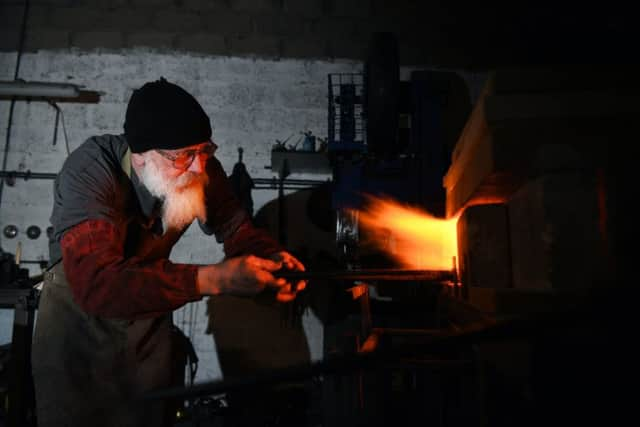Inside the York forge of a master craftsman
How sharp are these knives? The question hangs in the air of Falcon Forge as Carl considers his reply for a thinly sliced second.
“You could shave yourself with these,” he says. “Well, you don’t…”
“No!”


Advertisement
Hide AdAdvertisement
Hide AdCarl, who is 57, is a big man with a long white beard and a shaved head. Purpose made flesh, a man who likes doing and making. He has turned his hand to assorted practical things since being an apprentice on the railways in Derby.
Then he was a joiner and wood machinist for 11 years, before redundancy hit. After that he was a tree surgeon for a while, shinning up trees with a chainsaw; he made wooden surrounds for fireplaces, did whatever his useful hands could manage. And now he makes the loveliest knives you have ever seen, the flat surfaces covered in wavy patterns like oil on water, the whirls and whorls captured for ever in a steel pond.
“I’ve always been practical, I just like making things,” says Carl.
We are drinking tea, welcome in this cold space, and he is balanced on a small stool, having given his shorter visitor the old armchair by the wood-burner.


Advertisement
Hide AdAdvertisement
Hide AdIt might sound odd to describe a chef’s knife as beautiful, but that’s what they are; expensive, too, at least compared to a less costly blade.
Full-sized chef’s knives made by Carl sell for around £500 to £800, although smaller knives can be had for less. If that sounds a lot, Carl says it’s much cheaper than a top-end Japanese knife. “It’s about the same as getting a plumber in for the week,” he says, adding that each knife takes him around 40 hours to make – roughly the average working week.
The handles are fashioned from repurposed hardwood, perhaps old furniture or redundant tool, while Damascus steel is used for the blades. This pattern-welded steel uses a process developed in Syria’s capital city 1,000 years or more ago and favoured for the sharpest swords.
“It’s called Damascus steel because that’s where a lot of it was traded,” says Carl. “Other than the fact that I use a gas forge and a power hammer, it’s the same process.”


Advertisement
Hide AdAdvertisement
Hide AdHe favours Damascus steel over its ubiquitous stainless cousin because of its strength and better edge. His knives will “last forever if you look after them”.
“The thing with carbon steel is that it rusts, it’s not stainless, so you’ve got to dry them when you’ve finished and look after them a bit, but you get a much better edge with carbon than stainless because it’s harder basically.”
The paisley-like swirls do not sit on the surface but run through the blade, born in the heat of the forge and by hammering the married layers of steel. Each knife starts out with two different grades of carbon steel, one with some nickel in. Carl begins by ‘fire welding’ a sandwich made from the two carbon steels, forming a ‘billet’, in appearance like a thick steel ruler with a handle at one end. He holds that handle with a set of tongs, moving between the volcanic heat of the forge and his power hammer.
The steel is almost melting at that point. “I probably heat that three times and hammer in each time, when I’ll cut nearly all the way through the middle and fold that over, then reheat it and weld it again,” says Carl. “You’re doubling up the layers each time. It’s like a piece of plasticine really, except that it’s hot.”
Advertisement
Hide AdAdvertisement
Hide AdUsing a combination of techniques and cutting and restacking the original billet to increase the layers, Carl creates patterns that are delicate and intricate. Some of the random patterns are made from around 140 layers of steel, and a lot of heating and hammering.
“Now I’ve got that power hammer, it’s not so bad, but when I was doing it by hand…” Carl leaves the sentence hanging there.
The art lies in that patterning. “It gets more complicated as you go on,” says Carl. “Some of the patterns involve quite a lot of manipulating, and if you want to make a pattern working out how to do that in sections. And then join it together to give you what you want at the end.”
He points to the decorative designs on one of the finished blades. “Each one of those dimples is a hammer blow at some point during the welding,” he says.
Advertisement
Hide AdAdvertisement
Hide AdFor some of the more ornate patterns, Carl builds up the layers, rounds the corners off the steel billet, then clamps one end in the vice and twists the other end, tapping out the pattern, before flattening the steel out again.
His forge can take 30 minutes to reach the 1,400 degrees needed for Damascus steel. As the heat is building, Carl makes smaller items such as bottle openers and toasting forks. “While I’m waiting for it to get hot, I tinker about and make other stuff.”
His interest in Damascus steel came after he went on two three-day courses in Kent with Owen Bush, said to be one of the best sword makers in the country. A friend was going along and asked if Carl wanted to join him. “I nearly died when I found out how much it was,” he says, but that course set him off.
He taught himself more by watching YouTube videos, until he could start making knives. And he loves the whole process. How does he know when a knife is finished? “When I like it,” says Carl. “It’s art and skill and metalwork, a combination of all.”
Advertisement
Hide AdAdvertisement
Hide AdCarl never thought that he would end up making chef’s knives. “It’s a bit late to be starting something new,” he says.
“I’d never done any forging as such and I just love the fact that you can make something out of nothing.”
He would love to be able to live off making his bespoke knives, but for now he has another job renovating old kitchen ranges for Abacus Fireplaces in Pocklington.
But this summer he plans to start doing the country fairs and showcasing his metalwork skills.
Advertisement
Hide AdAdvertisement
Hide AdOne of Carl’s cheaper items is a knife made from a surprising metal: the plain steel from salvaged road chisels that spend their short lives bashing Tarmac.
“It’s really good steel,” he says. “I like reusing things and it just happens to be really good steel for making knives. I’ve got a mate who works for the council, and when they’re blunt they throw them away.”
This all adds up to working most of the time, but he feels good about the knives. “I don’t mind getting up in the morning now. I’m quite happy to get up and come to work here.”
Carl lives in York, close to York Cemetery, with his wife. When does he get to see her? “Not very often,” he says.
Advertisement
Hide AdAdvertisement
Hide AdLearning to make his knives has been difficult and at times a painstaking process. “Yeah, I don’t like to be beaten by anything…”
Does this work ever beat him? “It did and it still does sometimes. There are odd days when I think I’m not sure what I’m doing…”
Nowadays knives have so many negative connotations with stabbings in the news, and Carl has a theory about that. “Knives are like dogs,” he says. “It’s not the knife that’s the problem, it’s the idiot on the end.”
falconforge.co.uk